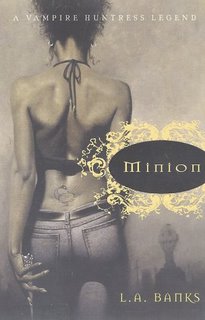
Fallon Nuit is a master vampire who had a seat on the vampire council but when he went rogue he was banished into eternal darkness. Through a series of accidents Fallon was able, with the help of the evil Egyptian deities known as Amanthra, to free himself and make several second- generation vampires that his rescuers can inhabit. Fallon's goal is total control of the vampire territories on Earth and the death of the slayer.
Street smart Damali Richards is making a name for herself and her group as a singer for Spoken Word. She is also the slayer protected by seven Guardians who battle the creatures of the night including the Amanthra vampires. As she is nearing her twenty-first birthday, she is coming into the full use of her considerable power and both Fallon and the vampire council want her stopped. There is only one person who can get close enough to her to achieve this objective, but she is also the only woman he ever cared about. It will be interesting to see if he will sacrifice his humanity for untold power and riches.
Minion is the first book in a five book series that will appeal to fans of Laurell K. Hamilton's Anita Blake, Vampire Executioner novels. L.A. Banks has written an urban fantasy novel that deals with several social issues in a manner that is both educational and entertaining. The character that is the most intriguing is the man who will be either the Slayer's savior or doomslayer which is why readers will want to read Awakening, book two. The sixth book, The Damed, will be coming out soon.


